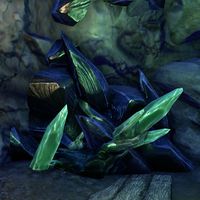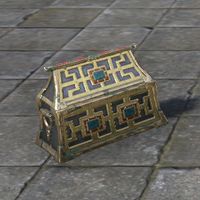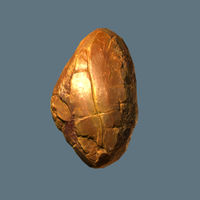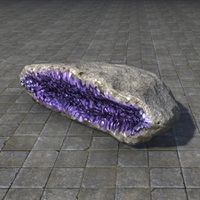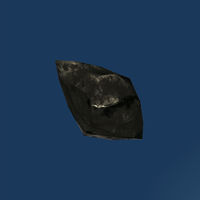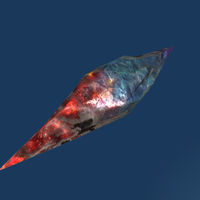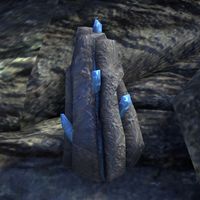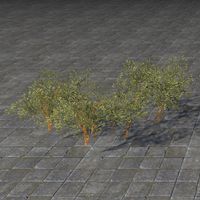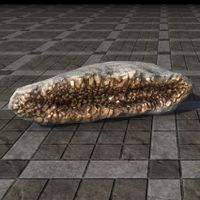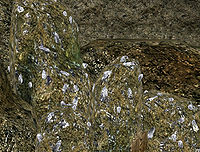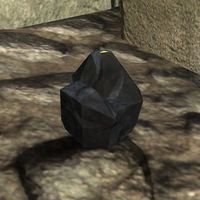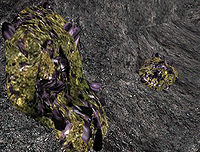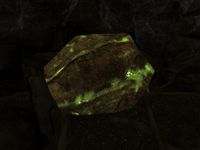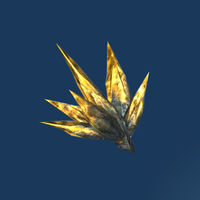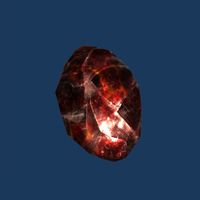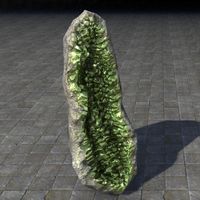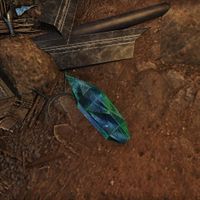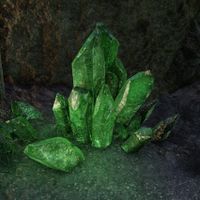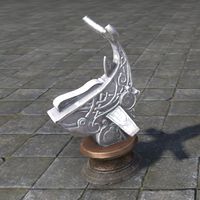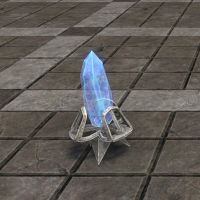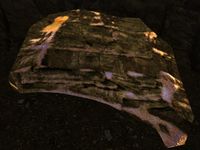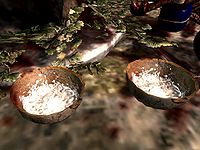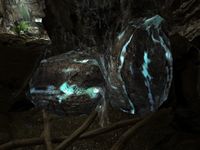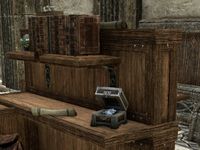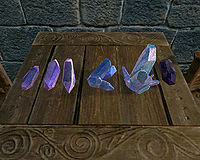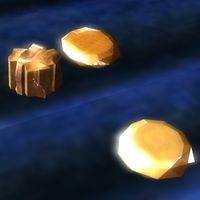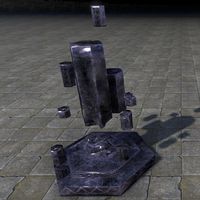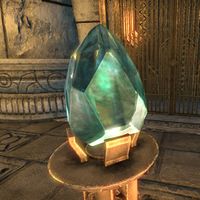Lore:Crystals
Aeonstone[edit]
Aeonstone is a green stone that can be found throughout mines in southern Elsweyr. Though it has no intrinsic power, aeonstone has the unique capability to store and amplify magical energy. In this state, the aeonstone becomes empowered and glows with a bright green hue. This unique property was discovered by the New Moon Cult, who would engage in ritualistic sacrifice to empower themselves and their masters. Many cultists used aeonstone in their armor. These stones would then allow cultists to greatly empower their own sorcery with this magic, even allowing necromancers to resurrect and enslave Dragons. Absorbing stored energy from aeonstone can be extremely dangerous for mortals, and improper usage can wreak havoc on the mage's body.
Aetherquartz[edit]
Aetherquartz is a "milky"[1] crystal that is similar to quartz in appearance. It is used predominantly by the Altmer, including in their jewelry, sacred objects,[2] and calians.[3] Dwemer used aetherquartz tonal resonators in construction of their vamidiums.[4]
Agate[edit]
Agate is a blue gemstone known to be used to make marbles for the Dark Elf children's game, "Keepers".[5] Dark Elves of House Dres occasionally incorporated black and white agates in their cameo brooches.[6] It is also used for decoration purposes.
Almandine[edit]
Almandine is a red type of garnet often used for enchanting armor and weapons.[7]
Amber[edit]
Amber is a colorful resin formed from hardened sap. It may be used in alchemy to produce a resist fire effect. The material is of limited use to the people of Tamriel, but in the Shivering Isles, amber smithing is an ancient art. The master smith of Bliss has the ability to make amber weapons and armor. Before the master dies, he will hide matrices throughout the realm and train an apprentice to continue the tradition.
For alchemy information, see the Alchemy lore entry.
Amethyst[edit]
Amethyst is a type of purple crystal. It is commonly used for decoration and aesthetic purposes, with them often being made into jewelry and are a common adornment in tombs and temples. Amethysts are found in geodes, and these geodes are always found in proximity to volcanic rock.
Aquamarine[edit]
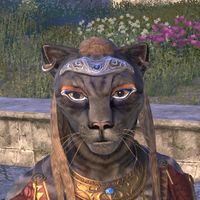
Aquamarine is a rare, blue gemstone.
Arentine[edit]
Aretine is a dense, heavy gem that has a unique property of absorbing all light around it. It is often used in high-end weapons and armor tempering.[8]
Atronite[edit]
Atronite is a mysterious stone from Oblivion. It is often left behind on Nirn when a powerful Atronach is defeated or dispelled.
Atronite is used by smiths for jewelry crafting and for tempering high-end weapons and armor. It is a rare and valuable gemstone, popular and valued by the nobility as a sign of strength and power. In appearance, it is a multihued crystal that emits an eerie sheen. Its coloration can include shades of blue, purple, and red.
Shards of Atronite have been used as an exotic form of currency on occasion. Odar's kingdom was known to use Atronite to trade for rare goods.
Aurbic Amber[edit]
Aurbic Amber are green gemstones that are often used to enhance enchantments on Jewelry.
Azurite[edit]
Azurite is a rare, blue mineral found within the northern hills of Bangkorai.[9] It has connections with Azura; the Spirit Wardens are known to carve decorative items from it[10] and use it to cleanse her shrines.[11]
Beryl[edit]
Beryl is a crystalline material. It is integrated into the mechanical flora of the Clockwork City, often found as a key component in shrubs and cypress trees within the realm. A specific type of blue dye, known as Abyssal Beryl is named after beryls. Additionally, beryl-inspired names are given to pets, used as nicknames, and even applied to formal names of variants of species, like the Berylglow Nix-Ox Steed. Beryl gemstones, sometimes adorned with ancestral runes, were used to craft coat buttons.
Bloodstone[edit]
Bloodstones are red gemstones that are often used to enhance enchantments on armor. These gems are also used by vampire hunters as a lure, when placed in water, the gem converts the water into blood, which can compel a fierce hunger even in the most sated vampire.[12]
Calcite[edit]
Calcite is a soft mineral.[13]
Carnelian[edit]
Carnelian is a purple gemstone often used to enhance enchantments on armor. The Dwemer used carnelian for certain theodolites — automated measuring devices designed to explore and survey subterranean areas.
Citrine[edit]
Citrine is a yellow variety of quartz that is often used to enhance weapons.[14]
Chalcedony[edit]
Chalcedony is a translucent form of quartz with a waxy luster, which can be found in a variety of colors from pale blue to deep brown. The unpolished stone has several uses in alchemy.[15]
Chrysoberyl[edit]
Chrysoberyl is a crystalline material used by Khajiit crafters.[16]
Chrysolite[edit]
Chrysolite is a crystalline material used by Dunmer crafters.[17]
Chrysocolla[edit]
Chrysocolla is a kind of unique cyan crystal. Chrysocollas, distinguished by their unique golden inclusions, held royal significance in Yokuda even prior to the Na-Totambu's reign. These gems were also embedded in weapons by the Yokudan's adversaries, the Lefthanded Elves, and were associated with invincibility in battle. They were often enchanted. In the Yoku tongue, they were strongly connected to defense. However the term defense is just a different tense of word offense in this language. Unlike the Lefthanded Elves, who integrated these gems into their ornamental defensive girdles, as an answer to the Ansei, Yokudans attributed lesser importance to the concept of defense.
Chysolite[edit]
Darklight Gemstone[edit]
Darklight gemstones are known to give off a light that makes unseen colors glow.[18]
Dawn-Prism[edit]
Diamond[edit]
Diamond is a kind of rare, transparent, and hard crystal that is extremely valuable. Their value is determined by their clarity and brilliance, unlike other gems. The difficulty in cutting a sample also plays a factor in its overall value. Not only is a diamond valuable, but it is very versatile and can be applied in crafting. For example, diamonds in the armor-making process reinforce the final product by improving its durability and resistance to critical attacks. Diamond can be an ingredient in alchemy and are commonly sold by fine alchemists. Crushed diamonds mixed with Bittergreen petals can make a potion of invisibility, an effect that is widely prized. Invisibility is one of several different effects that diamonds can produce, such as spell resistance, reflect, and detect key.
For alchemy information, see the Alchemy lore entry.
Dragonfire Crystal[edit]
Dragonfire crystals are black crystals whose dust is an ingredient for the illusion dazzlers used in the Jester's Festival.[19]
Ebony[edit]
Ebony, a rare volcanic glass, is one of the most precious substances in Tamriel, mainly found in Vvardenfell, buried in the lava flows from Red Mountain. Veins can also be found in Solstheim, and occasionally on mainland Skyrim, Cyrodiil and High Rock. Raw ebony itself is an extremely hard, durable, black glass-like substance. It is also known as Godsblood, as it is said to be the crystallized blood of a god or gods, Lorkhan in particular. The acquisition and use of ebony can lead mortals to transcend their limitations.
For alchemy information, see the Alchemy lore entry.
Emerald[edit]
Emerald is a kind of green crystal. It is extremely rare and valuable. It also possesses modest, innate magical properties.
For alchemy information, see the Alchemy lore entry.
Epidote[edit]
Epidote is a lustrous yellow-green crystalline mineral.
Faerite[edit]
Faerite is a mysterious stone that is noted to appear in locations where great feats of magic once occurred, considering its name, it is likely connected to the Faerie. It is often used for advanced tempering.[20] Archmage Ulfsild owned a paperweight made of faerite.[21]
Feldspar[edit]
Feldspar is a common mineral used in Dunmeri craftsmanship and art. One notable use is crafting sculptures, such as ones depicting the legendary Brothers of Strife Balreth and Sadal, from individual large feldspar crystals. Porphyry, known for its uses in alchemy is sometimes found embedded with feldspar crystals, and encased in hard igneous rock.
Firebreath Opal[edit]
Firebreath Opals look burning white-hot but are actually cool to the touch. They are used in the advanced tempering of weapons and armor.
Fire Opal[edit]
Fire Opals are commonly used for enhancing weapon enchantments.
During the invasion of the Battlespire, a Flame Atronach was known to have given the apprentice a 'Helm of the Fire Opal', which would diminish the effects of Frost Atronachs.[22]
Flint[edit]
Flint is a type of quartz often mined and used by Argonians.[23]
Argonian smiths use a technique called "slug shaping" which uses a specific type of slug called the Jassa Red, which when threatened, squirts out an acidic mucous that can be used for smithing. Argonians place the slugs onto the wood or stone and repeatedly flash a piece of flint directly behind them. Adjusting the position of the flint pushes the slugs in different directions. As the slugs move across the wood or stone, they leave behind a thin layer of acidic slime, creating long, smooth channels in the material.[24]
Flint can also be used to start fires.[25]
Garnet[edit]
Garnet is dark gemstone that is often combined with silver to make jewelry.[26][27][28] Garnet jewelry is quite common among the nobles of Tamriel and is said to be cheaper than jewelry made other stones.[29] Garnets are also used to craft armor,[30] temper materials,[31] and create mechanical automata.[32]
Glass[edit]
Common glass (not to be confused with malachite, often called "glass") is a transparent material often used in kitchenware, alchemy containers, and in construction. When stained, glass workers may use it to create beautiful glass mosaics, often used in temples. Glass handicraft goes back to the Merethic era, where early versions used obsidian, giving it a darker hue than modern glass. Trinkets made of obsidian glass have been found in the graves of Nedic leaders.[33] Vampires of the Reach are known to have constructed red stained glass windows that could counteract the dangers of sunlight.[34] Dwarfglass was a kind of glass used by the Dwemer to construct stalwart windows, which can withstand the pressure of the deepest seas.[35]
Hematite[edit]
Hematite is a kind of black crystal.
In addition to ebony, it is a commonly employed material for creating devotional artifacts dedicated to the Daedric Prince Mephala. Within the collection of Mephala devotional items, there existed silvery-black worry stones adorned with engraved symbols of the Webspinner on their surfaces. These stones were notorious for inducing severe headaches when rubbed.
Jade[edit]
Jade is a kind of green crystal often used for making jewelry and enhancing enchantments on armor. Jades and jade dust can be used in alchemy.
The legendary Necromancer's Amulet's skull is made of jade.
Jade is used for a variety of purposes by the Bosmer such as corkscrew handles and statuettes shaped as the Green Lady. Jade inkwells are used to contain the green iridescent ink used for writing official decrees from the Silvenar. Jade is used by the Sul-Xan to fashion their armors.
For alchemy information, see the Alchemy lore entry.
Jadeite[edit]
Jadeite is a kind of green crystal. It had various applications, including crafting decorative figurines for promoting alcohol brands, and containers like reliquiaries and presentation boxes.
Certain Baandari tarot cards were known for their engraved jadeite placards.
Some of the sharpening stones of the Orcish Morkul Forge were shown in jadeite presentation box sets which contained three sharpening stones of different density and coarseness.
Reliquaries, said to house a purported lock of hair belonging to Makela Leki, were discovered meticulously preserved within small, finely carved jadeite boxes, serving as reliquiaries.
Jasper[edit]
Jasper is the ore from which chalcedony is derived. It is a smooth opaque mineral and brown, red, or green iron deposits are often found within jasper. The unpolished stone has several uses in alchemy.[15]
Argonians are known to use polished blue jaspers in their jewelry. Bog-blue jaspers are a similar kind of jasper, said in Kothringi folklore to come from the gizzards of geels-ha butcher eels.[36]
Jet[edit]
Jet is a rough, dark gemstone.
Enchanted jet gemstones were occasionally imbued with the ability to emit a soft weeping sound when exposed to light, making them especially favored among Nocturnal's worshippers, as she is the Daedric Prince associated with darkness, night, and thievery.
The term "jet black" originates from the stone jet and is used to describe the hue of many dark-colored objects and materials such as ebony, and onyx, and even hair colors.
Lapis Lazuli[edit]
Lapis Lazuli (or just called Lapis)[37] is a blue gemstone that can be commonly found in the Summerset Isles. One of the most profitable mining prospects in Auridon is the lapis lazuli mine outside of Vulkhel Guard called Del's Claim. An old man named Del found the large deposit and staggered back into town to tell everyone, but no one believed him. But once people discovered it themselves, it became a very lucrative operation.[38] The Psijic Order are known to use studded lapis lazuli in addendum with turquoise in their belts. They also wear a scrying eye medallion with a large piece of glowing lapis as the eyeball.[37]
Larimar[edit]
Larimar, also referred to as sea-stone by merchants in Daggerfall, is a valuable milky-blue gemstone. This precious stone is exclusive to the Systres archipelago, making it extremely rare and expensive. The stone's hue is reminiscent of turquoise, albeit brighter and creamier. Some have compared its color to that of the Topal Sea.
During the Reman Empire's reign, larimar mining became a prominent industry in the Systres Archipelago due to the stone's rarity and high value, thanks to its exclusivity to the region. In 2E 11, the newly empowered Potentate Versidue-Shaie established a penal colony on Amenos, one of the islands of the archipelago, where political prisoners were forced to work in the larimar and ammonite mines.
It was also used by the Druids to create artictacts, such as the Oakensoul Ring. Ring's larimar gems were engraved with druidic runes and symbolized the Eldertide Circle.
Larimar had a broader range of applications. It was also utilized to create tokens for the widely popular game Tales of Tribute, as well as to create prosthetic eyes.
Lazurite[edit]
Lazurite is a sparkling blue ore, usually found close to sulphur deposits, usually embedded within limestone. The unpolished stone has several uses in alchemy, and crushed lazurite is used by artists in their paintings. When used in alchemy it has been proven to:
- Fortify vitality and constitution.
- Bolster armor and the damage inflicted while combat rages.
- Conjure a mystical bolt to penetrate the enemy, and a magical immunity about the user's being.
- Augments abilities to move with the shadows, and senses to spot those silently creeping.[15]
Lucent[edit]
Lucents are crystals of Daedric origins with the ability to contain and release energy. They are incorrectly likened to Soul Gems by some scholars due to mostly superficial similarities between them. Unlike soul gems, lucents can be reused numerous times, provided they are recharged. When shattered they create destructive explosions. Also unlike soul gems, they are powered by the background energy that pulses through all the realms of Oblivion. Although they can be commonly found in the mortal dwellings within the realms of Oblivion they are rarely used by non-Daedra.
Malachite[edit]
Malachite, commonly known as glass (and not to be confused with common glass), is a rare, volcanic, milky translucent green crystal that absorbs magicka under the right conditions. It is most often used in creating strong, yet lightweight metallic armor and weapons. The material is similar to ebony, but is less durable and more lightweight. It bears no relation to the common, brittle glass used in windows and ornaments, as it is far stronger and has a much higher melting point. It is most commonly found in Morrowind on the volcanic island of Vvardenfell, but ore veins can also be found all across Tamriel.
For alchemy information, see the Alchemy lore entry.
Mimic Stone[edit]
Mimic Stones are crystals of an orange-to-yellow hue. They were used by craftsmen throughout Tamriel during the Interregnum of the Second Era, often as a substitute for other materials such as goldscale or malachite.
They were available for purchase in quantities to suit any budget.
Neesak of Scrying[edit]
A Neesak of Scrying is a multi-faceted green swamp crystal that is believed to possess divinatory properties, and is used for fortune-telling or divination purposes. It is not uncommon in Murkmire.[39]
Niben-Crystal[edit]
Niben-Crystal is a type of Nibenese crystal renowned for its precision and clean, transparent finish. Among other uses, the Niben-Crystal was employed in crafting serving plates. It is not uncommon in Blackwood.[40]
Obsidian[edit]
Obsidian is black, volcanic glass created when lava cools rapidly. It is used most commonly by the Dunmer, often incorporating it in their crafting style.[41] Drenlyns are specialized nix-ox trainers that use obsidian drills to bore into the creatures' back and expose a series of nerves they call the "drive center."[42] The giant arches that mark the Shrine of Saint Veloth are made from obsidian.[43] Obsidian is a common material used by the Bosmer to make their spears and axes.[44] The Obsidian Husk is an artifact of mysterious origin that is also associated with the Webspinner, Mephala. It has been passed down through the Cult of the Spider for generations.[45]
Onyx[edit]
Onyx is a black gemstone that is mainly used for jewelry and decoration.[46] Onyx is known to be found in Cyrodiil[47] and in vast reserves at the peak of Hattu Mountain in Yokuda.[48]
Onyx is sometimes carried by priests of Sithis for various meditation practices.[49] It is also used for the Orcish version of chess which contains 32 pawns, 16 being onyx and 16 being moonstone.
Opal[edit]
Opal is a gemstone usually only found in Elsweyr and in Yokuda, it is often carved into objects such as snuff boxes and totems.[50] Opal spheres are sometimes used in Magrus worship.[51]
The Yokudans were known to use opals to create elaborate opal headdresses.[52]
Pearl[edit]
Pearls are smooth, round, and lustrous beads that are produced by mollusks. These are highly valued gemstones, either for their aesthetics or their magical properties. Their scarcity makes them a valuable commodity. Because they are a product of a living organism, pearls are unique in the realm of enchantment. The Elves in particular have an immense fascination with pearls, not only for their healing properties but their augmentative powers, as illustrated in Fandamorien's "Treatise on Vigor". Pearls are symbolically associated with the hard shell of clams, which Verita Numida of the Antiquarian Circle believed represented a defensive magical element.
For alchemy information, see the Alchemy lore entry.
Peridot[edit]
Peridot is a green gemstone.
Porphyry[edit]
Porphyry is a deep red or purple stone with feldspar crystals, found in igneous rock. The unpolished stone has several uses in alchemy.[15]
Purgeblood Salts[edit]
Purgeblood Salts are a rare ingredient that can be mined from Purgeblood Crystal Formations that are found exclusively in Deepscorn Hollow. It has several alchemical properties, most notably the ability to restore and fortify magicka.
For alchemy information, see the Alchemy lore entry.
Pyrine[edit]
Pyrine is a gold-colored gem of great power with relatively unknown origins. It is used for the tempering of armor and weapons.
Quartz[edit]
Quartz is prized by the Khajiit,[53] who carved trinkets such as ritual idols from the crystal.[54] Those who worship Trinimac use quartz crystals in art and armor to represent the clarity of his vision.[55] Rose quartz is a variety of quartz that has a pink hue.[56]
Resonance Crystal[edit]
Resonance Crystal, (also called Resonance Gem) is a kind of crystal known for its ability to amplify nearby noises and emit light. Resonance crystals are known to exist in various colors, including those exhibiting yellow and cerulean hues.
Within Breton society, these crystals were employed in mining operations to enhance the sounds within the mines, serving as early warnings of potential collapses. Additionally, they were utilized to amplify the strength and range of magic of thaumavocalists, and the overall volume of music and songs. Beyond their functional applications, resonance crystals were valued for their decorative potential, often incorporated into furniture pieces or featured as central elements in jewelry such as rings.
Resonance Gems were also used by the Dwemer.
Ruby[edit]
Ruby is a kind of red crystal. High-ranking members of the Gray Host are known to wear earrings featuring rubies soaked in vampire ichor.
For alchemy information, see the Alchemy lore entry.
Salt[edit]
Salt is a common mineral used in cooking and preservation.[57][58]
Sapphire[edit]
Sapphire is a kind of blue crystal often incorporated into various jewelry, such as amulets, rings, circlets, and necklaces. They are also used for tempering armor and in alchemy with them commonly having the trait of spell reflection. Star sapphire is known to have been used in equipment redolent of the Celestials.
Sapphires are sometimes found alongside other ores. On Solstheim, they also appear as geodes. The hills of Yokuda are said to have been filled with "nests" of sapphires, among other gems. The ancient Yokudans adorned themselves with anklets, necklaces, and bangles of sapphire and decorated their ancestral blades with the gem, prizing it for its color and luster.
In the Iliac Bay, temples are often an intermediary point for the smuggling of sapphires and other precious stones. Typically, the smuggler attaches the gem to a religious talisman and tasks a courier with delivering the talisman to a temple under guise of a returning an item on loan. At the temple, the gem is removed from the talisman and then discreetly taken to its true destination.
For alchemy information, see the Alchemy lore entry.
Sardonyx[edit]
Scythe Crystal[edit]
Seastone[edit]
Seastones, or sea stones are smooth, ocean-rounded gems often found along the shores of Tamriel and beyond. They are highly prized for their diverse shapes and colors and their role in various magical and alchemical practices, as well as their decorative qualities.
The Maormer, a seafaring people with a deep affinity for the magic, particularly cherish seastones. These stones, smoothed by the relentless waves of the sea, are sought after for their potential use in sea-related rituals. Among the Maormer, hues of blues and purples hold special value, though they remain exceptionally rare. Some Maormer are known to adorn themselves with earrings featuring small, pale blue stones that emit an ethereal inner light. The colors of seastones are not merely for aesthetic appreciation; they hold inherent magical significance. Seastones are not uniform in their magical and alchemical properties. While a smooth yellow-cast stone may be visually appealing, it often lacks substantial arcane value. On the other hand, blue and purple seastones are highly prized for their profound arcane resonance. Red and green stones fall somewhere in between on the arcane spectrum. It was theorized that the geographical origin and the duration of oceanic exposure contribute to the unique characteristics of each seastone. To harness the potential of seastones, individuals must engage in thorough testing and examination. Identifying the arcane properties of a seastone and understanding how it may be employed in spells or alchemical preparations requires careful scrutiny. Whether it's the specific hue or the duration spent in the sea, each factor influences the seastone's potential applications.
Aquamarine and larimar have both been referred to as seastone and sea-stone, respectively.
Sigil Geode[edit]
Sigil Geodes are crystalline stones which can be used to trap the souls of sentient beings for consultation and eventual release. Although similar to black soul gems, Sigil Geodes cannot be used for enchanting. If attempted, the soul will instead be safely released from the Geode and permitted to pass on to Aetherius. Sigil Geodes are therefore viewed by some as a more ethical form of necromancy, as the soul trapped within can be drawn into an ectoplasmic shell through applied conjuration and consulted at leisure. Although Sigil Geodes lose their charge within a few days and are therefore of no use for enchanting, souls suspended within can continue to be transferred between Geodes. Sigil Geodes are particularly useful for capturing the vestige of a Lesser Daedra; they become mesmerized by the stone's faceted glow, and are drawn within the Geode when it is pointed at them.
Slaughterstone[edit]
Soul Gems[edit]
Soul Gems are morpholiths used in the process of binding souls using magic. These gems are used to enchant and charge magical items, animate undead or artificial constructs, or cast powerful destructive spells. For this purpose, creatures' souls are usually trapped at the moment of death. Soul gems can be mined from geode veins, one of the locations to contain geode veins is Blackreach. The origin of Soul Gems can be traced back to Harvester of Souls himself, Molag Bal, who used a portion of his power in their creation. Black Soul Gems can be found within the depths of Coldharbour, where Bal fine-tunes them to increase their efficiency.
Stalhrim[edit]
Stalhrim is a rare form of enchanted ice found only on the island on Solstheim. Throughout history it has served various uses. Originally it was used in the burial rituals of ancient Nords. The deceased would be encased in the material as a form of protection, a privilege that was typically reserved for Nordic individuals. It has also served as a crafting material and, with the proper tools and techniques, can be used to create weapons, armor, clothing, and even jewelry.
Stalhrim armor (sometimes called ice armor) can be light, medium, or heavy in weight. It is very protective, and is often made with steel or quicksilver. Due to its innate properties, frost enchantments placed on items made of stalhrim are more potent. In its raw form, it can be used as an alchemical ingredient that induces paralysis and inflicts frost damage.
Stalhrim is often described as being hard as iron and impossible to break by conventional means. The only known way to mine it is with an ancient Nordic pickaxe, made from superior craftsmanship. It has been described as a rigid, blue-white crystalline metal, faceted yet smooth, and unnaturally cold to touch. Working with stalhrim is much like ebony smithing, and can only be performed by a skilled blacksmith.
For alchemy information, see the Alchemy lore entry.
Sunstone[edit]
Sunstone is a glass-like stone present in Atmoran sagas. According to legends they allowed a longship captain to see the sun's location even on a cloudy day, but their secret was lost long ago. Ysgramor was said to have used such stone in his voyages. Certain sunstones were inscribed with runes, around their perimeters. At least one such stone was a gift of great favor from a Nordic High King.[59]
Tiger's Eye[edit]
A gemstone that is known to be used for chess pieces.[60]
Toadstone[edit]
A semi-precious stone that was once thought to neutralize poison if placed in a drink.[61]
Topaz[edit]
Topaz is a kind of orange crystal often used in the making of jewelry. They have little use in enchanting or alchemy. Topaz dust can be ingested to fortify one's personality but damages their agility and luck.
For alchemy information, see the Topaz Dust entry.
Tourmaline[edit]
Tourmaline is a multihued crystalline mineral.
Tourmaline Swamp Jellies are vibrant subspecies of Swamp Jellies. The Argonian who named the subspecies cited the mineral as her inspiration, though she initially referred to it as 'watermelon jelly.' Its taste bears resemblance to the actual fruit.
Tourmaline Steeple, located within the Direnni complex on the Isle of Balfiera was a building. Very little is known about it, except that it contained housing chambers of the author of Once, Beredalmo the Signifier.
Turquoise[edit]
Turquoise is a blue/green gemstone often used on weaponry and for decorative purposes. It is known to be mined in Eastmarch
Turquoise glass treated with glow-spells is sometimes passed off as Welkynd Stones by scam artists.
For alchemy information, see the Alchemy lore entry.
Vitrine[edit]
Vitrine, also known as Dwemeri Glass, is a kind of glass used by the Dwemer and the Clockwork Apostles.
The Dwemer mined raw Malachite. They used vitrine, along with other materials, such as ebony, adamant and dwarven metal, for constructing certain vamidiums.
The Clockwork Apostles of Clockwork City used vitrine as well. It was used together with synthetic wool to create masks used to protect their eyes and faces during their travels through the Radius.
Void-Crystal[edit]
Void Crystal[edit]
References[edit]
- ^ The Price of Praxis — Ceruval Rolumaril
- ^ Apraxic Decanter codex entries in ESO
- ^ Aetherquartz Prayer Beads first antiquity codex entry in ESO
- ^ Aetherquartz Tonal Resonator antiquity codex entry in ESO
- ^ Lizard-Eye Marbles in ESO
- ^ House Dres Cameo Broach item description in ESO: Necrom
- ^ Almandine in ESO
- ^ Arentine description in Blades
- ^ Abbot Durak's dialogue during Azura's Aid in ESO
- ^ Azurite Figurine item desription
- ^ Azura's Aid quest in ESO
- ^ Sabonn's dialogue in ESO
- ^ Fortified Green Calcite Gears' description in ESO
- ^ Citrine weapon material in ESO
- ^ a b c d Agents and Reagents: The Bounty of Mundus — David S. J. Hodgson
- ^ Chrysoberyl Alfiq Candle Snuffer item description in ESO: Elsweyr
- ^ Brothers of Strife Gemstone Bookends treasure item in ESO
- ^ Darklight Gemstone's description in ESO
- ^ Jester King Emeric's dialogue during Royal Revelry in ESO
- ^ Faerite in Blades
- ^ Ulfsild's Log: The Gryphon and the Fox — Ulfsild
- ^ Fire Daedra's dialogue in Battlespire
- ^ Emberflint Mine in ESO
- ^ From Wrothgar to Lilmoth: A Smith's Tale, Vol 3 — Garnozag, Master Smith
- ^ The Story of Aevar Stone-Singer
- ^ Silver Garnet Ring in Skyrim
- ^ Silver Garnet Ring in Blades
- ^ Silver Garnet Necklace in Blades
- ^ Garnet item description in Blades
- ^ Garnets in ESO
- ^ Garnets as tempering materials in Blades
- ^ Coo in The Infernal City and Lord of Souls
- ^ Trifold Mirror of Alternatives antiquity description
- ^ Vampiric Stained Glass in ESO
- ^ Reinforced Dwarfglass Window, Massive in ESO
- ^ Bog-Blue Jasper Fetish antiquity codex entry in ESO: Blackwood
- ^ a b Crafting Motif 61: Psijic Style — Loremaster Celarus
- ^ Del's Claim loading screen text in ESO
- ^ Neesak of Scrying item description in ESO: Murkmire
- ^ Niben-Crystal Serving Plate item description in ESO: Blackwood
- ^ Obsidian style material in ESO
- ^ Dark Elves, Dark Hearts — Bakozog gro-Shakh
- ^ The Improved Emperor's Guide to Tamriel: Stonefalls and Deshaan — Flaccus Terentius, 2E 581
- ^ Common Arms of Valenwood — Mistral Aurelian Teriscor
- ^ The Obsidian Husk
- ^ Onyx Serpent Carving
- ^ Onyx Caverns in Oblivion
- ^ Lefthander's Aegis Belt codex entries in ESO
- ^ Shards of Nothing in ESO
- ^ Carved Whale Totem in ESO
- ^ Cat's Eye Prism in ESO
- ^ Jewels of Yokuda — Master-Jeweler Donielle Geonette
- ^ Merryvale Sugar Farm Caves loading screen text in ESO: Elsweyr
- ^ Rollin's dialogue regarding the quartz idol during A Night to Forget in ESO
- ^ Crafting Motif 22: Trinimac Belts — the Venerable Uugus, Priest of Trinimac
- ^ Statuette of Trinimac item description in ESO
- ^ Cooking in Skyrim
- ^ Corpse Preparation v III
- ^ High King Sunstone codex entries in ESO
- ^ Bosmer/Khajiit Gemstone Chess Set item description in ESO
- ^ Antique Anti-Venom Toadstone item description in ESO
